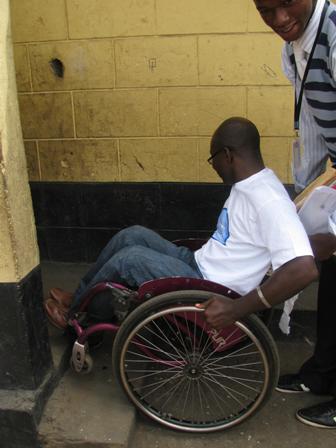As the world observes the International Day of Persons with Disabilities on Saturday, December 3 2016, WaterAid has reiterated the call for action from policymakers, local and national governments, and water and sanitation practitioners to ensure access to water, sanitation and hygiene (WASH) for all, especially for marginalised and very vulnerable groups such as those living with disabilities.

The international charity organisation disclosed in a statement on Friday, December 2 2016 that lack of access to WASH particularly affects disabled people living in poverty. It adds that inequalities are even starker when disability combines with another common cause of exclusion, such as gender, remoteness, ethnicity, chronic illness or ageing.
“If water, sanitation and hygiene services are not accessible in schools, hospitals, places of work and public places, people with physical impairments cannot fully benefit from them and discrimination against them means they are often unable to access these services. They may be stopped from using a tap because of social stigma and traditional beliefs that they are ‘dirty’, ‘cursed’ or verbally abused when attempting to use a public toilet,” WaterAid stressed, adding:
“The commitment to ensuring everyone has access to safe water, sanitation and hygiene by 2030 is critical not only for sustainable development but for ensuring we eliminate inequalities and leave no one behind. There can be no denying that access to inclusive water, sanitation and hygiene facilities and services improve health outcomes, impacts livelihoods, education and helps promote equity and inclusion.
“One billion people – 15 per cent of the world’s population – have some form of disability and the vast majority are living in the poorest communities in low- and middle-income countries, where poverty is both a cause and a consequence of disability. These images represent some of the progress we’ve been able to make in installing accessible facilities – including wheelchair-friendly toilets and ramps around water points – as well as in changing mind sets around disability in communities and in local governments.
“Across the six states where we currently work – from Jigawa to Benue, Plateau to Ekiti and Bauchi to Enugu – we are making progress ensuring more people with disability are living lives of dignity with inclusive water infrastructure, accessible toilets and improved hygiene services.”
The WaterAid Nigeria Head of Governance, Ms Tolani Busari, was quoted in the statement as saying:
“Too often, the reasons why it is hard to reach disabled people in poor communities are discussed and the lack of data, the lack of accessible infrastructure and the lack of fund are given as reasons to delay, postpone or even ignore what needs to be done. This is not an adequate response.
“The needs of people with disabilities are often neglected and absent from most policies and standards. Information is not accessible and so people remain unaware of their rights, good practices, and the options available to them. They are not involved in decision-making, which can lead to inappropriate design of services thereby denying them access. Imagine what it’s like not to be able to get into a toilet or reach a water point; see your way around accessing a WASH facility or to be overlooked because you cannot hear or see messages about good hygiene. Even worse, imagine the difficulty women and girls with disability go through especially when pregnant or menstruating.
“There is a need to do more to tackle inequalities and break the barriers and stigma around persons with disabilities. WaterAid has put equity and inclusion at the heart of its work and we have encouraged others to do likewise. There is more and more evidence of the progress that can be made when all people involved in delivering water and sanitation facilities start taking real, practical steps towards inclusive taps and toilets for all.
“We are calling for those people involved in delivering services to make them accessible for all, to end discrimination so people with disabilities can claim their rights to water and sanitation. This means promoting the rights to water and sanitation and how people can claim those rights. It is time to get real and get practical now.”
